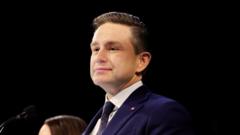The Conservative Party of Canada is facing a tumultuous aftermath following its recent electoral defeat, in which it famously squandered a 27-point lead in the polls. The election results sparked immediate finger-pointing among party members, especially after their leader, Pierre Poilievre, lost the seat he had occupied for two decades.
While the party secured almost 42% of the popular vote, its fourth consecutive election loss has prompted significant turmoil within. “Nobody’s happy about that,” noted Shakir Chambers, an Ontario-based Conservative strategist, emphasizing the pressing need for unity as the party contemplates its future direction.
A pivotal moment in the party's recovery efforts will be a caucus meeting scheduled for next Tuesday, where Poilievre announced his intent to run in a forthcoming special election in Alberta, following the departure of Conservative MP-elect Damien Kurek. Supporters, like Kurek, commend the leader's national campaign efforts and believe he should continue to represent the party in Parliament.
However, doubts linger over Poilievre's leadership. Mr. Chambers insists that Poilievre enjoys considerable backing among caucus members and points out that the situation is not dire for his leadership tenure. Former party leader Andrew Scheer publicly threw his support behind Poilievre, urging him to stay on board to lead a stronger campaign next time.
As conversations pivot to accountability, several Conservatives, including newly-elected Jamil Jivani, criticized Ontario leader Doug Ford. Jivani claimed that Ford's actions undermined federal efforts and diverted attention from the party's core message. Despite this, some strategists believe the need for introspection extends to Poilievre as well.
The leader has faced challenges appealing broadly to Canadians, especially since his combative style has drawn mixed responses across different regions. Conservative figures like Tim Houston of Nova Scotia indicated that the party needs a sincere effort to reconnect with voters, criticizing the past approach that may have alienated individuals rather than drawn them in.
While some provincial leaders, such as Alberta’s Danielle Smith and Saskatchewan’s Scott Moe, supported Poilievre during the campaign, others like Ford remained noticeably absent during key moments. Ford's campaign manager, Kory Teneycke, dismissed claims that Ford's lack of support was a significant factor in the loss, stating that the real challenge lies in Poilievre's capacity to forge a unified platform that resonates throughout Canada's diverse political landscape.
As Poilievre looks to restore confidence amongst ranks and facilitate healing within the party, calls for unity and a cohesive strategy are echoing ever louder. Finding a balance that embraces the varying identities of Conservative supporters across provinces will be critical for the party’s future and its next electoral battle.





















